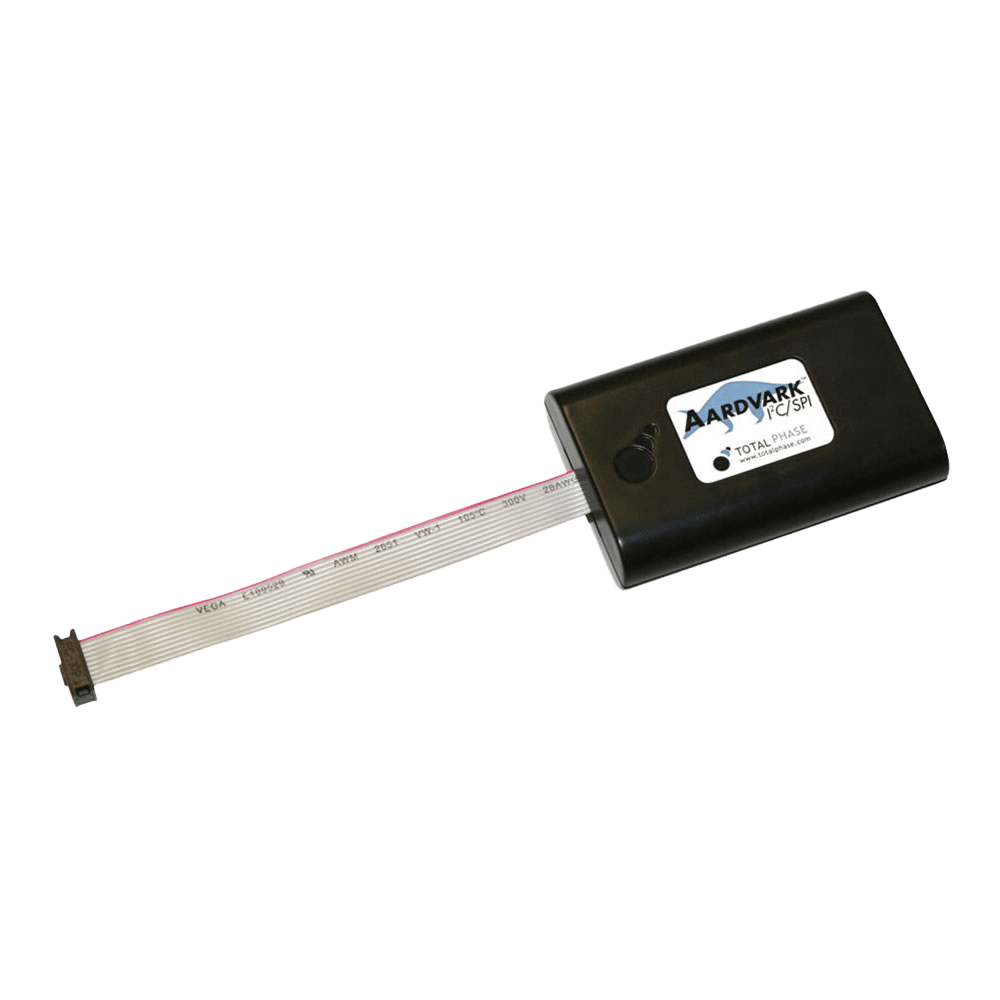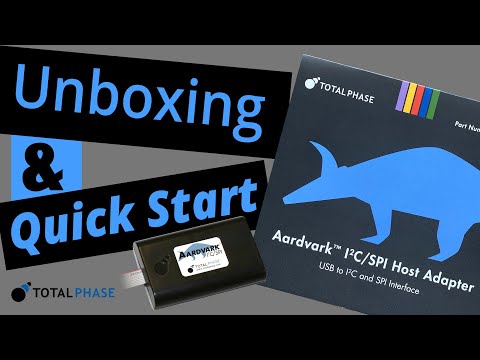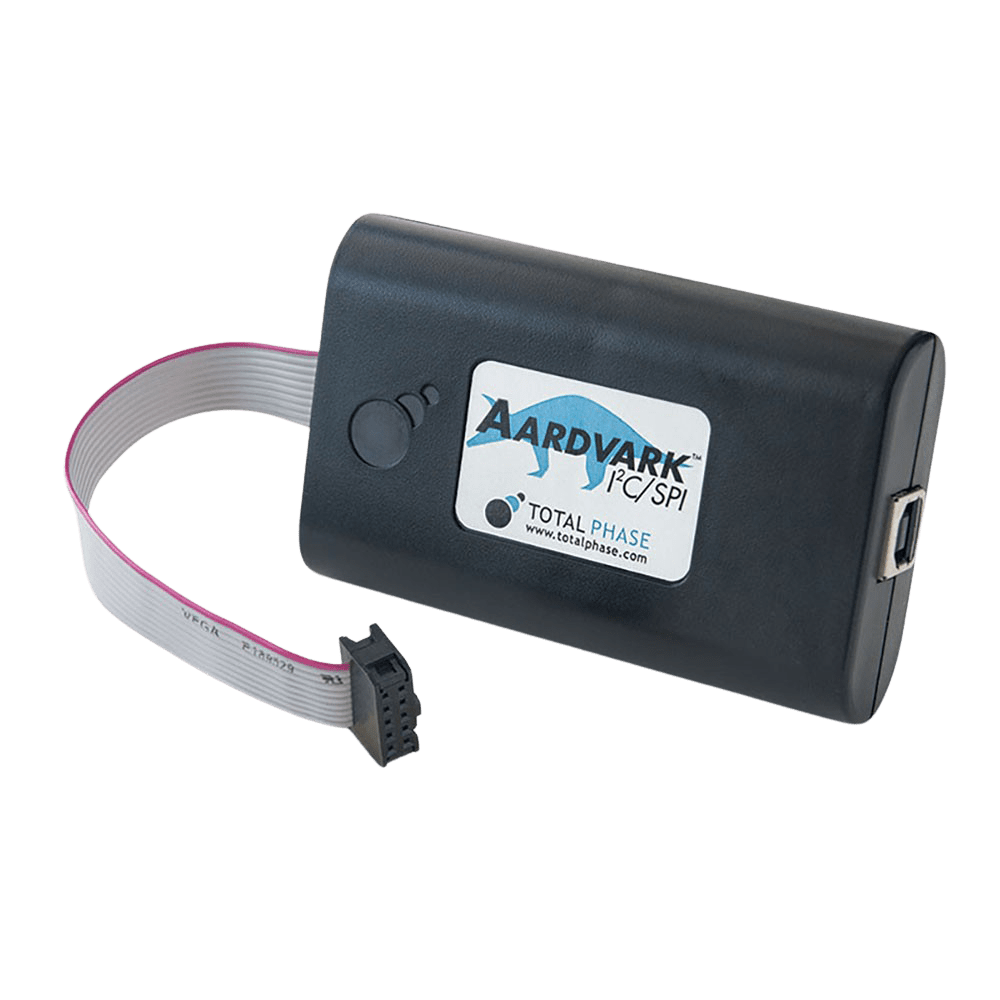
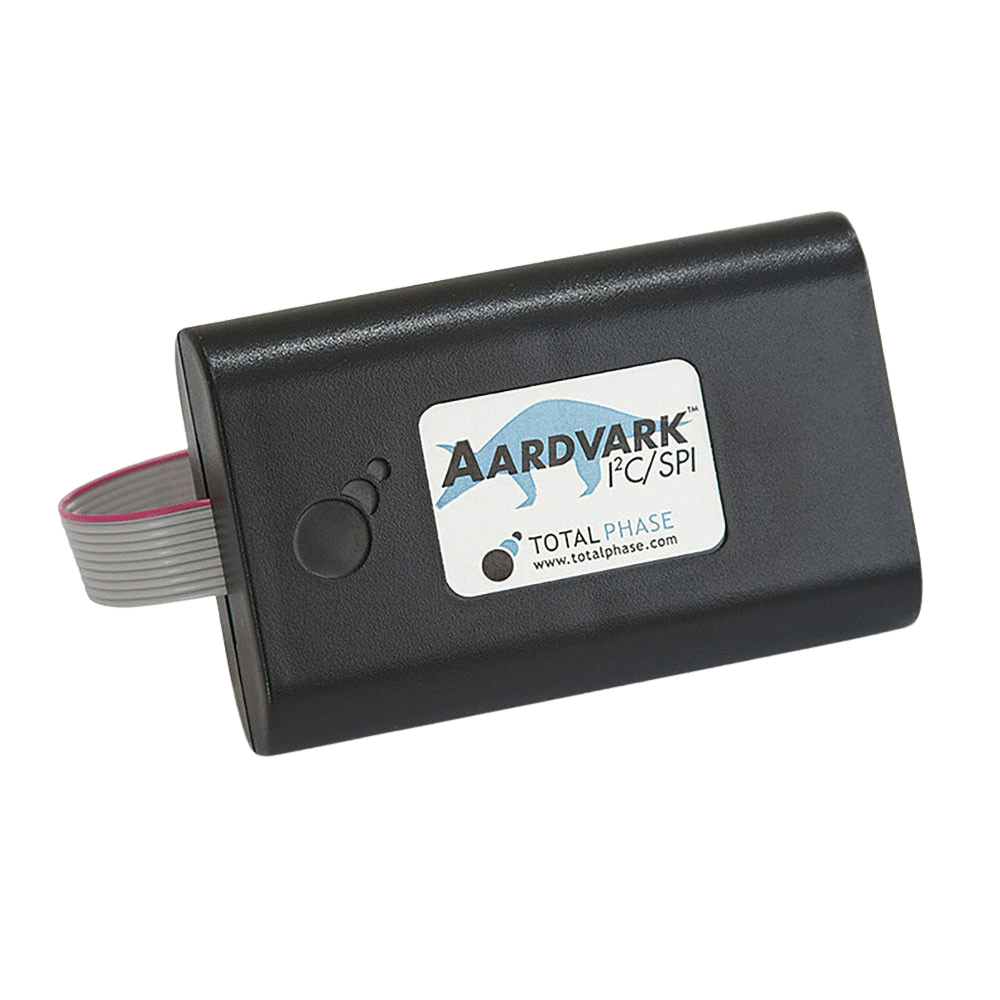
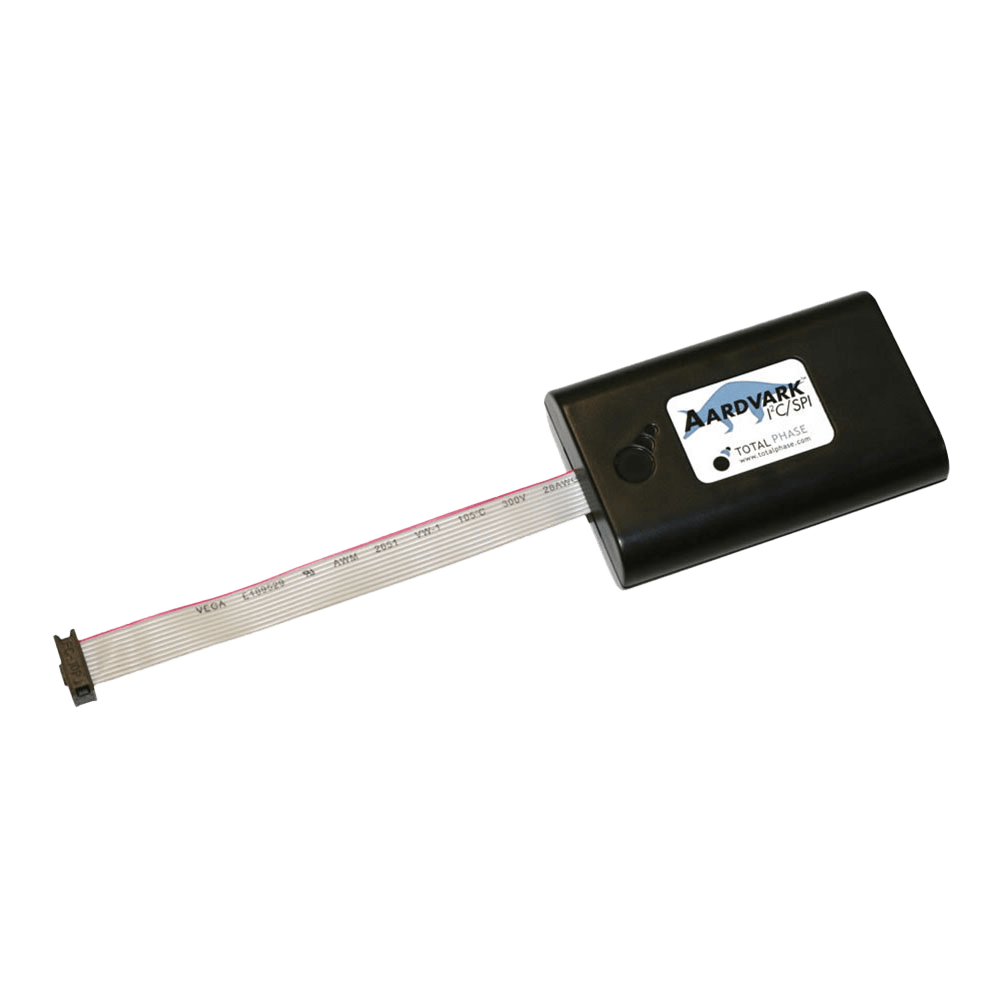
Key Features
Overview
Buy an Aardvark I2C/SPI and get 10% off a Beagle I2C/SPI*
The Total Phase Aardvark I2C/SPI Host Adapter is a USB-powered tool that enables direct, bidirectional communication with I2C and SPI devices from a Windows, Linux or macOS computer. It supports master and slave operation up to 800 kHz for I2C and up to 8 MHz/4 MHz for SPI master/slave, making it suitable for sensor evaluation, EEPROM/Flash programming, and automated test workflows. The standard 2×5 IDC target connector provides I2C, SPI and up to six GPIO lines; +5 V target power is available for low-current devices.
The included Control Center Serial software simplifies configuration and message transactions, with XML batch scripting for automation. Flash Center streamlines programming of I2C and SPI memories using an extensible parts library. Cross‑platform APIs (C/C/C#, Python, .NET) and LabVIEW drivers are available for integration into custom tooling.
Aardvark sits within a family of Total Phase tools: the higher‑performance Promira Serial Platform adds integrated level shifting and much higher I2C/SPI speeds, while the Beagle I2C/SPI Protocol Analyzer provides non‑intrusive bus capture—often used alongside Aardvark for concurrent generate‑and‑monitor workflows.
For engineers who need a dependable, well‑supported host adapter for everyday I2C/SPI bring‑up and production scripting, Aardvark delivers capability without complexity.
Downloads
Why Engineers Choose The Adaptateur hôte I2C/SPI Aardvark Total Phase
Industry Standard Tool
Master/Slave Flexibility
Complete Software Ecosystem
Achetez un Aardvark I2C/SPI et obtenez 10 % de réduction sur un Beagle I2C/SPI*
Présentation de l' adaptateur hôte I2C/SPI Aardvark de Total Phase - la solution standard de l'industrie pour des tests et une programmation I2C et SPI rapides et puissants. Cet adaptateur puissant se connecte à votre PC hôte via USB, vous permettant de travailler avec le bus I2C ou SPI sous Windows, Linux ou Mac OS X.
Avec le logiciel Total Phase Control Center inclus, vous pouvez facilement contrôler et tester les appareils connectés au bus, ce qui le rend parfait pour les tests de cartes dans un environnement de production. De plus, avec la possibilité d'exécuter des scripts personnalisés, les tests automatiques sont un jeu d'enfant. Et, avec le logiciel de programmation gratuit inclus, vous pouvez facilement programmer des appareils Flash. Et le meilleur dans tout ça ?
Le logiciel Total Phase Control Center peut être téléchargé gratuitement et mis à jour régulièrement sans frais de maintenance à payer ! Mettez à niveau vos tests et votre programmation I2C et SPI dès aujourd'hui avec l'adaptateur hôte I2C/SPI Aardvark de Total Phase.
| General Information | |
|---|---|
Part Number (SKU) |
TP240141
|
Model |
|
Manufacturer Manufacturer of the product
|
|
| Functional Features | |
Applications |
|
| Electrical | |
Interface Types |
|
Interface Features |
|
Interface Speed |
|
Interface Connections |
|
| Software | |
Included Software |
|
Software Updates |
|
Host OS Compatibility Works with these Operating Systems
|
|
API/SDK |
|
Automation |
|
| Physical and Mechanical | |
Dimensions |
|
Weight |
1.0 kg
|
Operating Temperature |
|
| Other | |
Certifications |
|
Warranty |
|
Country of Origin |
|
HS Code |
|
EAN |
5055383601769
|
Frequently Asked Questions
Have a Question?
-
Can my Aardvark be Upgraded?
Yes, The Aardvark firmware is stored in internal Flash Memory, which can be updated, free of charge when new firmware is released by Total Phase. Total Phase offers this free service which secures your investment in their products.
-
Can I Program I2C/SPI Memory Devices?
Yes, the Aardvark can program a wide range of EEPROM and Flash memory using the Flash Centre™ software.
-
How Long is the Aardvark Warranty
The manufacturer's standard warranty is twelve months. However, The Debug Store offers a full two-year warranty. We can do this because the Aardvark is so reliable.
-
How is the Aardvark Powered?
The Aardvark is powered from the host PC via the USB cable. The power consumption of the Aardvark is typically just 25mA.
This avoids having to use a separate power supply. -
The Aardvark Supports I2C and SPI Buses. Can it be used with any other Interfaces?
Yes, The Aardvark Host Adapters will also support:
Display Data Channel (DDC)
System Management Bus (SMBus)
Power Management Bus (PMBus)
Smart Battery Bus (SBBus)
Intelligent Platform Management Interface (IPMI)
Two-Wire Interface (TWI) -
Can the Aardvark Support Multiple Slave Addresses?
Yes and no. The Aardvark can only behave as one I2C address node at any one time. However, the slave address can be changed by using the Aardvark API Software as required.
-
Does The Aardvark Support I2C Clock Stretching?
Yes, clock stretching is supported by the Aardvark as a Master or a Slave.
Clock stretching can only be initiated by the slave device. It does this to extend an I2C bus cycle. Note that not all I2C Master or slave devices may support clock stretching so this needs to be considered when clock stretching is relied upon. -
Can the Aardvark adapter be used for programming EEPROMs and Flash memory?
Yes, the Aardvark is excellently suited for programming I2C and SPI-based EEPROMs and Flash memory devices. The included Flash Centre Software supports over 500 memory chips from major manufacturers including Atmel, Microchip, Intel, STMicroelectronics, Cypress, and many others. The software provides an XML-based device library that can be extended for custom memory devices. Programming operations include reading, writing, erasing, and verifying memory contents with built-in error checking. The Aardvark can handle various memory types including 24FC series EEPROMs, AT25 series SPI Flash, and supports both page write and random access programming modes. For production environments, multiple Aardvark adapters can be used simultaneously for parallel programming operations.
-
Which programming languages and operating systems does the Aardvark support?
The Aardvark adapter supports multiple programming languages including C, C++, C#, Python 2/3, .NET, Visual Basic .NET, Visual Basic 6, and LabVIEW through its comprehensive API. It is compatible with Windows (7, 8, 10, 11), macOS (10.4 Tiger through 12 Monterey), and various Linux distributions including Ubuntu, Fedora, Red Hat, SuSE, CentOS, Debian, and Arch Linux in both 32-bit and 64-bit versions. The device comes with free software including Control Centre Software for graphical interface operations, Flash Centre Software for EEPROM/Flash programming, and a complete API with example code for custom application development. All software is provided licence-free and receives regular updates without maintenance fees.
-
Can the Aardvark adapter be used for programming EEPROMs and Flash memory?
Yes, the Aardvark is excellently suited for programming I2C and SPI-based EEPROMs and Flash memory devices. The included Flash Centre Software supports over 500 memory chips from major manufacturers including Atmel, Microchip, Intel, STMicroelectronics, Cypress, and many others. The software provides an XML-based device library that can be extended for custom memory devices. Programming operations include reading, writing, erasing, and verifying memory contents with built-in error checking. The Aardvark can handle various memory types including 24FC series EEPROMs, AT25 series SPI Flash, and supports both page write and random access programming modes. For production environments, multiple Aardvark adapters can be used simultaneously for parallel programming operations.
-
What GPIO capabilities does the Aardvark provide?
The Aardvark adapter provides up to 6 GPIO pins that can be configured for general-purpose input/output operations. When operating in I2C-only mode, the four SPI pins (MISO, SCLK, MOSI, SS) become available as GPIO pins numbered 02, 03, 04, and 05. Similarly, in SPI-only mode, the two I2C pins (SCL, SDA) can function as GPIO pins 00 and 01. Each GPIO pin can be individually configured as input or output, with internal pull-up resistors available for input pins. The GPIO functionality supports interrupt-like operations through the aa_gpio_change function, which can detect pin state changes within a specified timeout period. All GPIO pins operate at 3.3V logic levels with a maximum drive current of 10 mA per pin.
-
What is the maximum cable length and distance limitations for the Aardvark?
The standard Aardvark ribbon cable is 130.175 mm (5.125 inches) long with a 1.27 mm (0.050 inch) pitch. For extended distances, the cable limitations depend on the communication protocol and signal integrity requirements. High-speed SPI communications up to 8 MHz should use shorter cables to maintain signal integrity, whilst lower-speed I2C communications at 100-400 kHz can tolerate longer cable runs. The device can work with custom cables, but users must ensure proper impedance matching and signal integrity. For applications requiring longer distances, level shifter boards can be used to improve signal quality, and multiple Aardvark adapters can be daisy-chained for extended reach applications. The USB connection between the Aardvark and host computer follows standard USB cable length limitations of up to 5 metres for USB 1.1/2.0 connections.
-
What protocols and communication standards does the Aardvark support beyond basic I2C and SPI?
Beyond standard I2C and SPI protocols, the Aardvark adapter supports several related communication standards and variants. For I2C communications, it supports Display Data Channel (DDC), System Management Bus (SMBus), Power Management Bus (PMBus), Smart Battery Bus (SBBus), Intelligent Platform Management Interface (IPMI), and Two-Wire Interface (TWI). The adapter handles advanced I2C features including repeated start conditions, 10-bit addressing, combined format transactions, clock stretching, and multi-master configurations. For SPI communications, it supports configurable clock polarity and phase settings, adjustable slave select polarity, and both MSB-first and LSB-first bit ordering. The adapter can operate with various SPI variants and custom protocols through its flexible GPIO capabilities. Additional protocols can be implemented through custom software applications using the comprehensive API, enabling support for proprietary or specialised communication standards. The device's GPIO functionality allows implementation of bit-banged protocols or custom signalling schemes as required by specific applications.
-
Can multiple Aardvark adapters be used simultaneously on one system?
Yes, multiple Aardvark adapters can be connected and operated simultaneously on a single host computer. Each Aardvark device receives a unique port number that can be identified using the aadetect utility or aa_find_devices API function. This capability enables parallel programming of multiple memory devices, simultaneous monitoring of different bus segments, or independent control of separate embedded systems. The USB bus provides sufficient bandwidth and power for multiple Aardvark adapters, with each device consuming less than 100 mA. Software applications can open handles to multiple adapters concurrently and control them independently through separate API calls. This multi-adapter capability is particularly valuable in production environments where gang programming or parallel testing operations are required. The Control Centre Software can manage multiple connected Aardvark adapters through its device selection interface.
-
What is the Total Phase Aardvark I2C/SPI Host Adapter?
The Total Phase Aardvark I2C/SPI Host Adapter is a versatile USB-to-I2C/SPI interface tool designed for electronic design engineers. It serves as a bridge between your computer (Windows, Linux, or macOS) and embedded systems, enabling communication with I2C and SPI devices for prototyping, debugging, and programming applications. The Aardvark can operate as both master and slave for I2C communications up to 800 kHz and SPI communications up to 8 MHz (master) or 4 MHz (slave). Additionally, it provides up to 6 GPIO pins for general-purpose input/output operations, making it an essential tool for electronic design engineers working with embedded systems.
-
Can the Aardvark adapter be used for SPI communication?
Yes, the Aardvark adapter is a versatile tool that supports both I2C and SPI communication protocols. For SPI, it offers impressive speeds of up to 8 MHz in master mode and 4 MHz in slave mode. This dual-protocol support makes it an invaluable asset for developers working with mixed-protocol systems or those who need flexibility in their testing and development processes. For higher speed SPI communications, the Total Phase Cheetah and Promira may be more suitable
-
Does the Aardvark adapter support multi-master I2C configurations?
Indeed, the Aardvark adapter supports I2C multi-master configurations, which is a significant feature for complex embedded systems. This capability allows multiple master devices to coexist on the same I2C bus, enabling more sophisticated system architectures. It's particularly useful in scenarios where multiple controllers need to initiate communication independently, such as in distributed control systems or IoT applications.
-
Can the Aardvark adapter be used for debugging I2C communication issues?
Absolutely. The Aardvark adapter excels in debugging I2C communication issues, including elusive problems like missing ACK signals. Its ability to monitor bus activity in real-time, coupled with the detailed analysis features in the Control Center software, makes it an indispensable tool for identifying and resolving complex I2C issues. Engineers can use it to capture and analyze transactions, detect timing violations, and even emulate I2C devices to isolate problems.
-
What software is included with the Aardvark adapter?
The Aardvark adapter comes bundled with Total Phase's Control Center software, a powerful and user-friendly interface for configuration and control. This software provides a graphical interface for real-time monitoring, data capture, and analysis of I2C and SPI communications. It also supports scripting for automated testing, making it an essential tool for both manual debugging and automated quality assurance processes.
-
Can the Aardvark adapter be used in production testing environments?
Definitely. The Aardvark adapter is designed to be robust and reliable, making it suitable for automating production testing processes. Its programmable interface and support for scripting allow for the creation of automated test sequences, which can significantly speed up quality control procedures. The adapter's ability to handle both I2C and SPI protocols also makes it versatile for testing various components on a production line, from sensors to memory chips.
-
How does the Aardvark adapter compare to the Promira serial platform?
While both are Total Phase products, they serve different needs. The Aardvark adapter is generally more affordable and simpler to use, making it ideal for basic to intermediate I2C and SPI applications. The Promira serial platform, on the other hand, offers higher speeds (up to 40 MHz for SPI) and more advanced features like multi-protocol support (including I2C, SPI, and CAN). The Promira is better suited for high-performance applications or situations requiring more complex protocol analysis.
-
Can the Aardvark adapter be used as an alternative to NI-845x adapters?
The Aardvark adapter is often considered a cost-effective alternative to NI-845x adapters for many applications. While NI-845x adapters are known for their integration with National Instruments' ecosystem, the Aardvark offers comparable I2C and SPI functionality at a more accessible price point. It provides a good balance of performance and affordability, making it suitable for a wide range of development and testing scenarios where the full NI ecosystem isn't required.
-
Does the Aardvark adapter have adjustable pull-up resistors?
Yes, the Aardvark adapter features adjustable pull-up resistors, which is a crucial feature for flexible I2C configurations. This allows users to optimize the bus characteristics for different loads and speeds, ensuring reliable communication across various scenarios. The ability to adjust pull-up resistors is particularly useful when working with devices that have different I/O voltage levels or when dealing with long bus lines that may require stronger pull-ups.
-
Does the Aardvark adapter support GPIO functionality?
Indeed, the Aardvark adapter includes GPIO (General Purpose Input/Output) pins that can be used alongside I2C and SPI interfaces. This feature greatly extends the adapter's versatility, allowing users to implement custom signalling, trigger external events, or control additional hardware. The GPIO functionality can be particularly useful for simulating complex scenarios, implementing chip select lines for multiple SPI devices, or synchronizing the adapter's operations with other equipment in a test setup.
-
Is there a Python API available for the Aardvark adapter?
Yes, Total Phase provides a comprehensive Python API for programming and controlling the Aardvark adapter. This API allows developers to integrate the adapter's functionality directly into their Python scripts or applications. It provides a high-level interface for configuring the adapter, sending and receiving data, and analyzing communication protocols. The Python API is particularly valuable for creating custom test scripts, automating data collection processes, or integrating the Aardvark into larger software ecosystems.
-
Can the Aardvark adapter be used for testing sensors with I2C interfaces?
The Aardvark adapter is exceptionally well-suited for testing and evaluating I2C sensors. Its ability to act as both a master and slave on the I2C bus allows for comprehensive sensor testing. Engineers can use it to simulate a microcontroller interfacing with a sensor, verify sensor outputs, test different I2C speeds, and even stress-test sensors under various conditions. The adapter's software tools also facilitate easy data logging and analysis, which is crucial for sensor characterization and quality assurance processes.
-
How does the Aardvark adapter compare to the Beagle protocol analyser?
While both are Total Phase products, they serve different primary purposes. The Aardvark is designed for interfacing and basic analysis, making it ideal for interactive debugging and development work. It allows users to actively participate in I2C and SPI communications. The Beagle, on the other hand, is a more advanced protocol analyzer focused on passive monitoring and in-depth analysis. It offers higher capture speeds, more detailed timing analysis, and can handle more complex protocol scenarios. For many developers, the Aardvark is sufficient for day-to-day work, while the Beagle is used for more specialized debugging and performance optimization tasks.
-
Is the Control Center software compatible with XML scripting?
Yes, the Control Center software that comes with the Aardvark adapter supports XML scripting, which is a powerful feature for creating automated test and control sequences. This capability allows users to define complex operations, including device configuration, data transmission, and response analysis, in a structured XML format. The XML scripting support is particularly valuable for creating repeatable test procedures, automating firmware updates, or integrating the Aardvark adapter into larger automated testing frameworks. It provides a balance between the ease of use of a graphical interface and the power of programmatic control.
-
Can the Aardvark adapter be used for programming EEPROMs?
Yes, the Aardvark adapter is an excellent tool for programming EEPROMs using either I2C or SPI interfaces. Its software support includes features specifically designed for memory operations, such as read, write, and verify functions. The adapter's speed and reliability make it suitable for both small-scale prototyping and larger production runs. Additionally, the ability to script operations allows for the creation of custom programming sequences, which can be particularly useful when working with EEPROMs that have unique command structures or timing requirements.
-
Is their a CAD file available for this part?
Sorry, no as the design files for the product are proprietary. However, the Aardvark is a simple object which can easily be measured to assist with placing it into your equipment. Many customers include the Aardvark into production test rigs successfully.
-
What problems does the total phase aardvark i2C/SPI host adapter solve?
The Total Phase Aardvark I2C/SPI Host Adapter is a device that solves the problem of interfacing between a computer and other devices through the I2C and SPI protocols. The adapter provides a convenient and reliable way to connect and communicate with I2C and SPI devices, allowing developers to easily debug, test, and program these devices. By using the adapter, developers can save time and effort in developing their projects, as well as reduce the risk of damaging the target device during the testing and debugging process.



